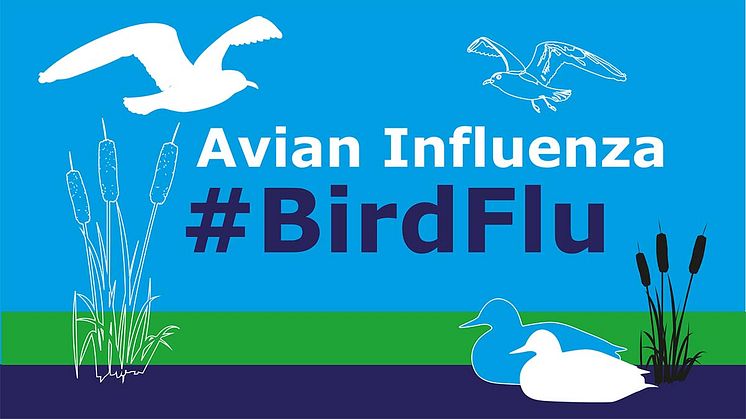
News -
Avian influenza - new housing measures start today
The Chief Veterinary Officers for England, Scotland, Wales and Northern Ireland have agreed to bring in new housing measures to protect poultry and captive birds from avian influenza following a number of confirmed cases across Great Britain.
The new housing measures, which come into force today (Monday 29 November 2021), mean that it will be a legal requirement for all bird keepers in Bury and across the UK to keep their birds indoors and to follow strict biosecurity measures in order to limit the spread of and eradicate the disease.
Wild birds migrating to the UK from mainland Europe during the winter months can carry the disease and this can lead to cases in poultry and other captive birds.
Public health advice remains that the risk to human health from the virus is very low and food standards bodies advise that avian influenzas pose a very low food safety risk for UK consumers. Do not touch or pick up any dead or sick birds that you find and instead report them to the relevant helpline below. There is no impact on the consumption of properly cooked poultry products including eggs.
The additional housing measures build on the strengthened biosecurity regulations that were brought in across Great Britain as part of the Avian Influenza Prevention Zone (AIPZ) on 3 November 2021.
The introduction of housing measures means that from 29 November 2021, in addition to housing all poultry and captive birds, keepers must continue taking extra precautions to keep their flocks safe. This includes regularly cleaning and disinfecting equipment, clothing and vehicles when entering or exiting sites and limiting access to non-essential workers or visitors.
Poultry and captive bird keepers are advised to be vigilant for any signs of disease in their birds and any wild birds, and seek prompt advice from their vet if they have any concerns.
Poultry keepers must now do the following:
- house or net all poultry and captive birds to keep them separate from wild birds
- cleanse and disinfect clothing, footwear, equipment and vehicles before and after contact with poultry and captive birds – if practical, use disposable protective clothing
- reduce the movement of people, vehicles or equipment to and from areas where poultry and captive birds are kept, to minimise contamination from manure, slurry and other products, and use effective vermin control
- thoroughly cleanse and disinfect housing on a continuous basis
- keep fresh disinfectant at the right concentration at all farm and poultry housing entry and exit points
- minimise direct and indirect contact between poultry and captive birds and wild birds, including making sure all feed and water is not accessible to wild birds
- These new housing measures will be kept under regular review as part of the government’s work to protect flocks.
- Register as a keeper of birds in the borough of Bury
- https://www.gov.uk/guidance/avian-influenza-bird-flu
- https://www.gov.uk/guidance/avian-influenza-bird-flu#public [TB1]
For the latest government information please access the following link
If members of the public come across any sick or dead birds it is important that they do not touch or pick them up.
Dead wild birds should be reported to the Defra helpline on 03459 33 55 77.
The Animal and Plant Health Agency (APHA) may then collect some of these birds and test them for the presence of avian influenza to help understand how the disease is distributed geographically and in different types of bird, not all birds will be collected.
Further information can be found in Defra’s advice to the public available on GOV.UK
If you find dead wild waterfowl (swans, geese or ducks) or other dead wild birds, such as gulls or birds of prey, while you are out, you should report them to the Defra helpline (03459 33 55 77). Do not touch or pick up any dead or visibly sick birds that you find. For further information: on Avian Influenza go to;
https://www.gov.uk/guidance/avian-influenza-bird-flu
Lesley Jones, Director of Public Health for Bury Council, said: " I want to reassure residents that the risk to public health from avian flu is very low.
"However, it is important that people do not pick up any sick or dead birds to avoid spreading the virus, which can affect humans in rare cases.
"If you do find any dead swans, geese or ducks or other dead wild birds while out and about, please report them to the Defra helpline on 03459 33 55 77.
"I would also urge bird keepers to be vigilant for any signs of disease and report any suspected cases to their nearest Animal and Plant Health Agency (APHA office).”
The Animal and Plant Health Agency (APHA) carries out year-round avian influenza surveillance of dead wild birds submitted via public reports and warden patrols. The APHA will collect some of these birds and test them to help us understand how the disease is distributed geographically and in different types of bird, not all birds will be collected.
Avian influenza is in no way connected to the COVID-19 pandemic which is caused by the SARS-CoV-2 virus which is not carried in poultry.
More information
How to spot avian influenza (bird flu), what to do if you suspect it, and measures to prevent i:
More information
How to spot avian influenza (bird flu), what to do if you suspect it, and measures to prevent i:
- https://www.gov.uk/guidance/avian-influenza-bird-flu
- https://www.gov.uk/guidance/avian-influenza-bird-flu#public
ENDS
Issued: 29 November 2021.

